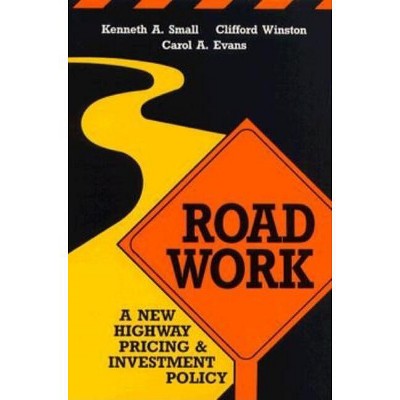Revitalizing a Nation - by Clifford Winston & Jia Yan (Paperback)

About this item
Highlights
- Revitalizing A Nation: Competition and Innovation in the US Transportation System argues that it would be far more efficient and equitable if US policymakers prioritized greater competition and innovation instead of relying on taxpayer-funded spending to significantly improve the transportation system.
- About the Author: Clifford Winston is a senior fellow in the Economic Studies Program at the Brookings Institution and Jia Yan is a professor of economics at Washington State University.
- 368 Pages
- Business + Money Management, Industries
Description
About the Book
Revitalizing A Nation: Competition and Innovation in the US Transportation System argues that it would be far more efficient and equitable if US policymakers prioritized greater competition and innovation instead of relying on taxpayer-funded spending to significantly improve...Book Synopsis
Revitalizing A Nation: Competition and Innovation in the US Transportation System argues that it would be far more efficient and equitable if US policymakers prioritized greater competition and innovation instead of relying on taxpayer-funded spending to significantly improve the transportation system.
Review Quotes
"Recent years have seen a resurgence of interest in transportation economics, in part stimulated by new technologies such as electric and autonomous vehicles. This volume provides an invaluable economic analysis of some of the key public policy issues. It will be of great interest to both research scholars and public policymakers."
"Since its origins in France in the early 19th century, transportation planning has been an incubator for the economic theory of incentives and consumer behavior. In its more recent history in the United States, transportation planning has become a branch of civil engineering, with a command-and-control approach to the design of transport infrastructure and the operation of transit systems. This book provides policy recommendations and empirical evidence that the use of economic markets and the incentives introduced through decentralization, privatization, and competition can increase the efficiency and utility of our transportation system. This is a provocative message that will get pushback from the transportation community, but it initiates a dialogue that can lead to significant improvements in the design and operation of our transportation infrastructure."
"This timely volume presents new research on the efficient design of transportation systems, reminds us that how a nation deploys transportation technology and utilizes its public and private transportation capital are key determinants of economic performance, and highlights the central role of public policy in the transportation sector."
About the Author
Clifford Winston is a senior fellow in the Economic Studies Program at the Brookings Institution and Jia Yan is a professor of economics at Washington State University.










